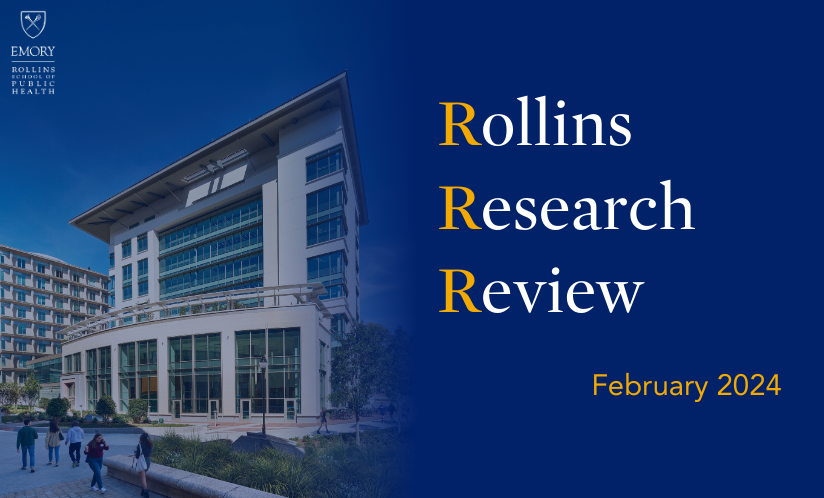Rollins Research Review: Air Pollution and Cardiovascular Health, Breastfeeding to Curb Antibiotic Resistance, and Experiences of Violence in People Living with HIV

By Shelby Crosier
This month, Rollins researchers authored papers on a wealth of public health topics. Find summaries of a few highlights below.

Journal: Journal of Epidemiology & Community Health
Rollins Authors: Zachary McCann, PhD; Howard Chang, PhD; Rohan D’Souza; Noah Scovronick, PhD; Stefanie Ebelt, ScD
Important Takeaways:
- Exposure to fine particulate matter (PM5) in the air is a known risk factor for cardiovascular disease, but previous research about how social and economic factors may influence that relationship have had mixed results.
- The research team looked at data on daily levels of PM5 in the air and emergency department visits in Missouri to investigate whether cardiovascular events caused by PM2.5 exposure were affected by the social and economic factors in the census tract where an individual lived.
- Across the board, PM5 exposure was associated with higher risk of a cardiovascular event, and this association was stronger in census tracts with higher poverty levels in both rural and urban areas. Other factors, like employment and high school graduation rates, had an effect during warmer seasons.
- This study highlights the socioeconomic conditions that could be the most useful for policymakers to address in order to reduce incidents of PM5-related cardiovascular disease.

Journal: BMC Pregnancy and Childbirth
Rollins Author: Elizabeth Rhodes, PhD
Important Takeaways:
- Breastfeeding peer counseling is proven to improve breastfeeding outcomes for women with low incomes, both in the U.S. and globally, and the World Health Organization recommends it as a person-centered practice—one that respects and responds to the needs, preferences, and values of an individual.
- In this study, researchers interviewed 28 women about their experiences participating in a breastfeeding peer counseling program.
- The women interviewed had positive experiences in the program, and received effective communication, respect and dignity, and emotional support from breastfeeding peer counselors in a variety of ways, all of which are vital components of person-centered care.
- The results underscore the importance of breastfeeding peer counselors in not only improving breastfeeding outcomes, but also delivering quality, person-centered care.
Journal: Gut Microbes
Rollins Author: Maya Nadimpalli, PhD
Important Takeaways:
- In middle-income countries with a high burden of bacterial disease, young children are often exposed to and colonized by antibiotic-resistant bacteria, which can cause fatal infections.
- Researchers investigated whether breastfeeding during the first 16 months of a child’s life could reduce their risk of acquiring extended-spectrum beta-lactamase (ESBL)-producing Enterobacterales in their digestive tracts, a measure that can be used to gauge the level of antibiotic resistance in communities.
- Exclusive breastfeeding during the first six months of life did not affect the risk of gut-colonization of any studied ESBL-producing Enterobacterales. However, continuing to breastfeed past the first six months, even after the children start to eat solid food, significantly lowers the risk.
- These findings support the implementation of policies that support breastfeeding as a possible tool to help stop the spread of antibiotic resistance globally.

Journal: Frontiers in Public Health
Rollins Authors: Jessica Sales, PhD; Katherine Anderson; Melvin Livingston, PhD; Sophia Garbarino; Salaem Hadera; Eve Rose; Madelyn Carlson
Important Takeaways:
- There is a well-established link between experiences of violence and poor HIV outcomes, but these experiences remain under-studied in people living with HIV across gender and sexual orientation.
- Researchers surveyed 285 people living with HIV in Atlanta to learn about their experiences with different forms of violence.
- There were high rates of past adverse childhood experiences, intimate partner violence, non-partner-violence, and hate crimes among the sample, with gay men being more likely than women or straight men to have experienced violence.
- The findings highlight that to increase engagement in HIV care, it is important to train health care providers in trauma-informed approaches and make mental health and social support services available at clinics and hospitals that serve people living with HIV.


